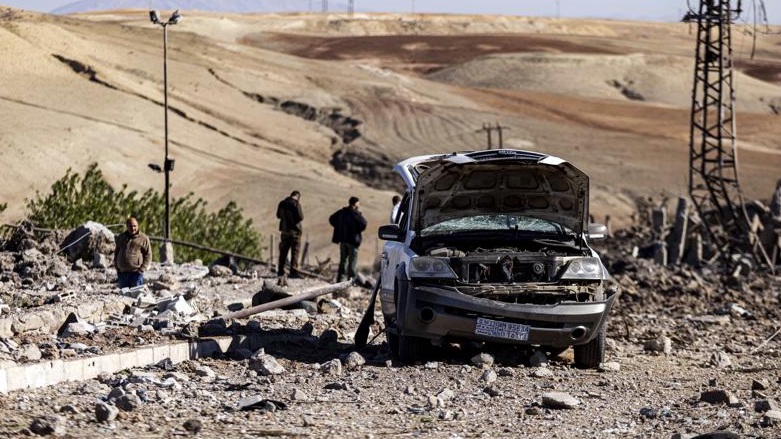US: ’Deeply concerned’ over Turkish threats to northeast Syria; calls for ‘immediate de-escalation’

WASHINGTON DC, United States (Kurdistan24) On Wednesday afternoon, the Defense Department issued a strong statement calling for an “immediate de-escalation” of the conflict along the Turkish-Syrian border. It was then followed by a similar statement from the State Department.
Both statements marked a toughening of Washington’s declaratory position. Earlier, softer US statements, evidently influenced by a desire to maintain good ties with Turkey, because of its mediating role in the Ukraine war, seemed to have had little effect.
However, it was not clear that Wednesday’s warnings would deter a Turkish ground offensive into northeast Syria, which the US now apprehends.
The usually well-informed Washington Post columnist, David Ignatius, wrote late on Wednesday that a Pentagon official had suggested to him that there was little indication now that Ankara was preparing to back down.
Latest US Statements
The US statements on Wednesday followed Turkish attacks earlier that day which targeted a prison in northeast Syria that holds hundreds of captured ISIS fighters; oil production facilities; and a security post at the al-Hol camp, where the families of ISIS fighters are detained.
The post was manned by the Kurdish-led Syrian Democratic Forces (SDF), America’s partner in the fight against ISIS in Syria. After the attack, neither SDF nor US troops were able to assess the damage, including whether any prisoners had escaped, because a Turkish drone remained flying over the camp.
Read More: Turkey targets ISIS prison, oil facilities in northeast Syria
Read More: Turkish planes target Syria's al-Hol camp: SDF
“The Department of Defense is deeply concerned by escalating actions in northern Syria, Iraq, and Turkiye,” Pentagon Press Secretary Brig. Gen. Patrick Ryder said in his statement on Wednesday. “This escalation threatens the Global Coalition to Defeat ISIS’s years-long progress to degrade and defeat ISIS.”
“Recent air strikes in Syria directly threatened the safety of U.S. personnel who are working in Syria with local partners to defeat ISIS and maintain custody of more than ten thousand ISIS detainees,” Ryder continued.
“One of the strikes hit within 130 meters of U.S. personnel, so American forces are at risk,” Col. Joseph Buccino, CENTCOM Spokesman, told Ignatius. “Any extension of these attacks will drive up that risk,” he said.
Ryder called for an “Immediate de-escalation” in order “to maintain focus on the defeat-ISIS mission and ensure the safety and security of personnel on the ground committed to the defeat-ISIS mission.”
Similarly, State Department Spokesperson Ned Price called for “an immediate de-escalation” in the statement released by the State Department several hours later, as he, too, condemned the “recent military action that destabilizes the region, threatens our shared goal to fight ISIS, and endangers civilians and U.S. personnel.”
Weak US Response to Initial Attacks
Wednesday’s statements followed an initial, weak US response to Turkey’s attacks early on Sunday, targeting what Ankara claimed were Kurdistan Workers’ Party (PKK) sites in the Kurdish north of Syria and Iraq.
Over 30 Syrian civilians were killed in those strikes, according to the Syrian Observatory on Human Rights (SOHR.)
Later on Sunday, a round of rocket fire from northern Syria injured six Turkish policemen at a border crossing. On Monday, another round of rocket fire from Syria killed two people in Turkey, and Turkish President Recep Tayyip Erdogan threatened a ground attack into Syria—a threat he has repeated on a daily basis.
Price delivered the first US response, in a cautiously worded statement, published late on Monday.
Addressing the conflict across the Turkish-Syrian border, Price said, “We urge de-escalation in Syria to protect civilian life and support the common goal of defeating ISIS.”
Read More: US carefully urges ‘de-escalation’ in Syria’ and denounces ‘uncoordinated military action in Iraq’
As Soner Cagaptay of The Washington Institute for Near East Policy, remarked to the news magazine, Politico, “I can’t recall any statement that nicely worded about Turkey’s incursion into Syria in a long time.”
Nor was the one sentence in Price’s statement dealing with Turkey’s bombing of the Kurdistan Region much different. “We continue to oppose any uncoordinated military action in Iraq that violates Iraq’s sovereignty.”
Notably, the statement failed to mention the party doing the bombing (Turkey), nor the party being bombed (Kurds.)
Presumably, the key factor inhibiting a tougher US response was the desire to maintain cordial ties with Turkey, because of the central role it is playing in mediating with Russia over the Ukraine war—the top national security concern of the US and Europe.
The predictable followed, however, from the weak US response to the initial assault: Ankara merely escalated its attacks.
What is next?
The SDF commander, Gen. Mazloum Abdi, expressed his concerns on Wednesday to Ignatius, as well as Fox News, which reported, “There are growing concerns” that Turkey “may be about to launch a ground attack” into northeast Syria.
Citing Abdi, Ignatius suggested that Turkey’s likely targets would be Manbij and Kobani, as he explained that Abdi had “urged U.S. officials to pressure Turkey to de-escalate its attacks before there is a disaster.”
But a Pentagon official told Ignatius, expressing some significant pessimism that “there was ‘no sign that [the Turks] are ready to de-escalate.’”
